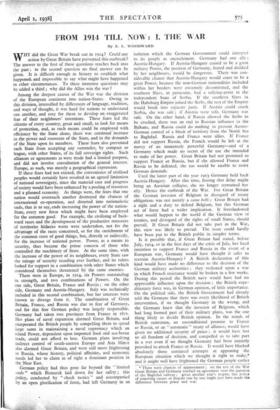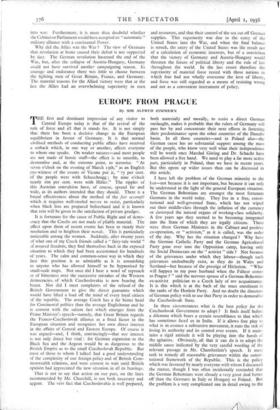FROM 1914 TILL NOW : I. THE WAR
By E. L. WOODWARD
WHY did the Great War break out in 1914? Could any action by Great Britain have prevented this outbreak? The answer to the first of these questions reaches back into the past ; to the second question no final answer can be given. It is difficult enough in history to establish what happened, and impossible to say what might have happened in other circumstances. To these immense questions may be added a third ; why did the Allies win the war ?
Among the deepest causes of the War was the division of the European continent into nation-States. Owing to this division, intensified by differences of language, tradition, and ways of thought, it was hard for nations to understand one another, and easy for them to develop an exaggerated fear of their neighbours' intentions. These fears led the citizens of every country, great and small, to look for means of protection, and, as such means could be employed with efficiency by the State alone, there was continual increase in the power and resources of the State, and in the demands of the State upon its members. These fears also prevented each State from accepting any surrender, by compact or league, with other States, of its full sovereign rights. Such alliances or agreements as were made had a limited purpose, and did not involve consultation of the general interest. Europe, as such, was merely a geographical expression.
If these fears had not existed, the convenience of civilised peoples would certainly have resulted in an agreed limitation of national sovereignty, since the material ease and progress of society would have been enhanced by a pooling of resources and a planned economy. As things were, the fears that one nation would overreach another destroyed the chances of international co-operation, and diverted into nationalistic ends, that is to say, ends increasing the power of the nation- State, every new force which might have been employed for the common good. For example, the civilising of back- ward races, and the ,,development of the productive resources of territories hitherto waste were undertaken, not for the advantage of the races -concerned, or for the enrichment of the common store of good things, but, directly or indirectly, for the increase of national power. Power, as a means to security, thus became the prime concern of those who controlled the machinery of State. At the same time, with the increase of the power of its neighbours, every State saw the mirage of security receding ever further, and its rulers looked for support in a combination with other States which considered themselves threatened bi the same enemies.
There were in Europe, in 1914, six Powers outstanding in strength, and two combinations of Powers. On the one side, Great Britain, France and Russia ; on the other side, Germany and Austria-Hungary. Italy was technically included in this second combination, but her interests were known to diverge from it. The combination of Great Britain, France, and Russia was due to fear of Germany, and for this fear German policy was largely responsible. Germany had taken two provinces from France in 1871. Her plans of naval expansion alarmed Great Britain, and exasperated the British people by compelling them to spend large sums in maintaining a naval supremacy which an island Power, dependent upon imported food and sea-borne trade, could not afford to lose. German plans involving indirect control of south-eastern Europe and Asia MinDr also alarmed Great Britain, and were still more frightening to Russia, whose history, political affinities, and economic needs led her to claim as of right a dominant position in the Near East.
German policy had thus gone far beyond the " limited ends " which Bismarck laid down for her safety ; this Policy, conducted by " shock tactics " and accompanied by an open glorification of force, had left Germany in an isolation which the German Government could interpret to its people as encirclement. Germany had one ally ; Austria-Hungary. If Austria-Hungary ceased to be a great military Power, the position of Germany, feared and disliked by her neighbours, would be dangerous. Thete was con- siderable chance that Austria-Hungary would cease to be a great Power, because the non-German nationalities included within her borders were extremely discontented, and the southern Slays, in particular, had a rallying-point in the independent State of Serbia. If the southern Slays in the Habsburg Empire joined the Serbs, the rest of the Empire would break into separate parts. If Austria could crush Serbia, she was safe ; if Austria were safe, Germany was safe. On the other hand, if Russia allowed the Serbs to be crushed, there was an end to Russian influence in the Balkans, and Russia could do nothing to prevent Austro- German control of a block of territory from the North Sea to Baghdad. Russia and France were allies. If France did not support Russia, the French would be left at the mercy of an immensely powerful Germany—and of a Germany which made no secret of the use she intended to make of her power. Great Britain had not promised to support France or Russia, but if she allowed France and Russia to be defeated, she too would be unable to resist German demands.
Until the latter part of the year 1913 Germany held back Austria-Hungary. After this time, fearing that delay might bring an Austrian collapse, she no longer restrained her ally. Hence the outbreak of the War. For Great Britain the German invasion of Belgium in disregard of treaty obligations was not merely a caws belli ; Great Britain had a right and a duty to defend Belgium, but this German act of force had a wider implication. It foreshadowed what would happen to the world if the German view of treaties, and disregard of the rights of small States, should prevail. If Great Britain did not take part in the War, this view was likely to prevail. The issue could hardly have been put to the British public in simpler terms.
Is it possible that, if Great Britain had stated, before July, 1914, or in the first days of the crisis of July, her fixed intention to support France and Russia in the event of a European war, Germany would have thought it safer to restrain Austria-Hungary ? A British declaration of this kind would have made no difference to the decision of the German military authorities ; they reckoned upon a war in which French resistance would be broken in a few weeks. During this period the British navy would have had no appreciable influence upon the decision ; the British expe- ditionary force was, in German opinion, of little importance. On the political side, the British Government had already told the Germans that there was every likelihood of British intervention, if we thought Germany in the wrong, and the Germans knew that the invasion of Belgium, which had long formed part of their military plans, was the one thing likely to decide British opinion. In the minds of British statesmen, an unconditional promise to France or Russia, or an "automatic" treaty of alliance, would have given no additional security of peace ; it would have lost us all freedom of decision, and compelled us to take part in a war even if we thought Germany had been unjustly provoked to attack France or Russia. It would have blocked absolutely those continual attempts at appeasing the European situation which we thought it right to make,* and it might well have frightened the German people earlier
* There were chances of appeasement ; on the eve of the War Great Britain and Germany reached an agreement over the question of the Baghdad railway ; given another year's respite, this policy of removing causes of dispute one by one might just have made the difference between peace and war.
into war. Furthermore, it is more than doubtful whether the Cabinet or Parliament would have accepted an "automatic " military alliance with a continental Power.
Why did the Allies win the War ? The view of Germans that revolution at home caused their defeat is not supported by fact. The German revolution hastened the end of the War, but, after the collapse of Austria-Hungary, Germany could not have survived another campaigning season. In courage and endurance there was little to choose between the fighting men of Great Britain, France, and Germany. The material reasons for the Allied victory were that at the last the Allies had an overwhelming superiority in men and resources, and that their control of the sea cut off German supplies. This superiority was due to the entry of the United States into the War, and when the final balance is struck, the entry of the United States was the result not of a calculation of economic interests, but of a conviction that the victory of Germany and Austria-Hungary would threaten the future of political liberty and the rule of law throughout the world. In the last resort therefore the superiority of material force rested with those nations in which fear had not wholly overcome the love of liberty, and force was still regarded as a means of resisting wrong and not as a convenient instrument of policy.















































 Previous page
Previous page